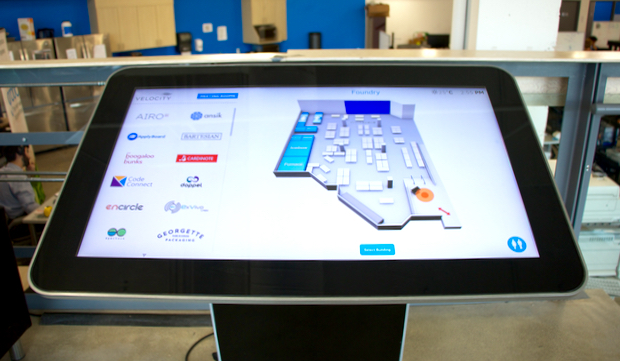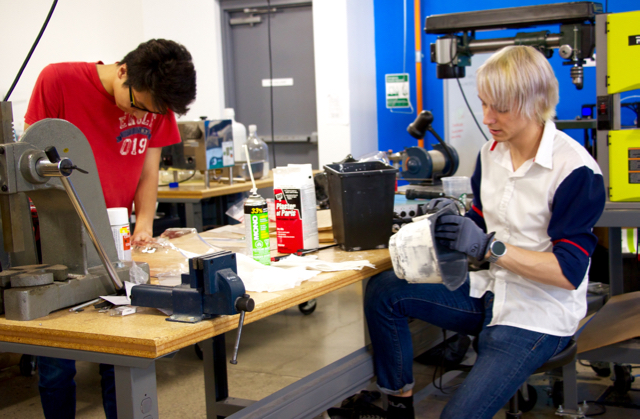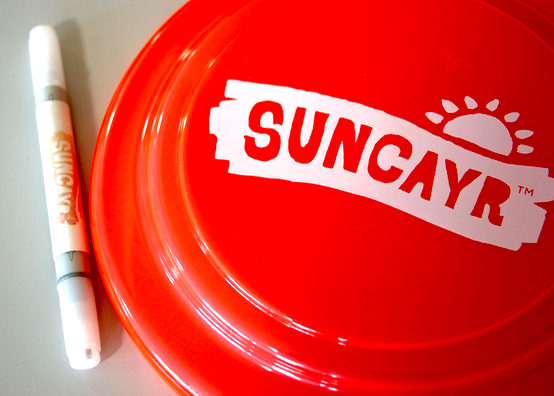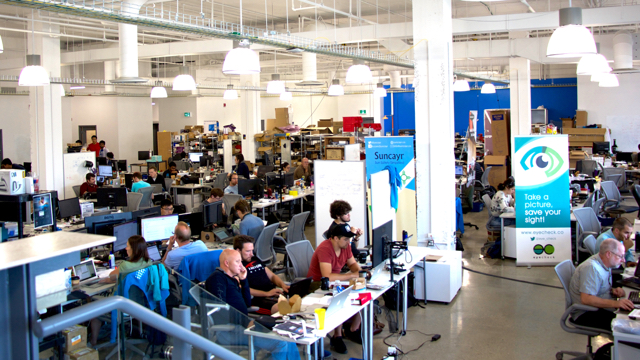Waterloo Region was long known as a makers’ community, where leather tanning, furniture making and general manufacturing of physical goods were common occupations.
Today, the region is seeing renewed interest in building hardware. However, this time around, things are a little different.
The hardware being built in Waterloo today is intelligent hardware, connected to our homes, offices and the broader physical world.
A year ago, the University of Waterloo’s tech entrepreneurship program, Velocity, opened its second incubator to support local hardware startups. The space was named the Velocity Foundry, and it opened down the street from the original Velocity Garage in the Tannery building on Charles Street West in downtown Kitchener.
The Foundry launched with 20 companies, but within four months, it was nearly full, with 30 companies.
The move to open a sister facility for hardware startups was largely initiated by Mike Kirkup, Velocity’s director, who oversees both the Garage and the Foundry. Peter Heuss is the Foundry’s on-site manager and supervises its activities. In creating the Foundry, Kirkup had recognized an increased emphasis on hardware that was brewing among student startup entrepreneurs.

Visitors?are?welcomed?to?the?Foundry?by?this?interactive?map?made?by?Velocity?alumni,?
MappedIn. (Communitech photo: Alexandra Satok)
“There is a shift or reawakening in building hardware companies in general now,” Kirkup said.
Kirkup cited three major developments in explaining the hardware trend:
- Entrepreneurs can now turn to crowdfunding to validate products and raise revenue through presales, which can de-risk their companies.
- Prototyping is faster and cheaper than it has ever been.
- Models that were successful in selling software are being adapted for hardware, including selling devices at cost and then using monthly subscriptions to generate revenue.
Kirkup also acknowledged that building hardware is in the DNA of the region.
“The flipside is that this region as a whole has always been very good at building hardware solutions, and the engineering program at the University of Waterloo is a big part of that,” he said.
Grobo is one of 32 startups in the Foundry today. The company has developed an automated gardening system to make it easy for anyone to grow fresh food at home.
The company worked out of the Velocity Garage for a few months, but when the Foundry opened, it seized the opportunity to be immersed in a true hardware space.

Yixin?Duan?(left),?intern?at?Grobo,?works with CTO?Chris?Thiele?on?a?prototype?for?the?company’s?
in-home?garden?system. (Communitech photo: Alexandra Satok)
“Beforehand, nobody had a place to build hardware,” said Bjorn Dawson, CEO at Grobo. “Everything was spread out. Then, all of a sudden [the Foundry] brought everything together, and allowed more people to get into hardware.”
The Foundry provides startups with space to work, tools to construct and mentorship to grow. It is no wonder that it filled up so quickly, given the surge in hardware startup activity.
Today, every inch of the 11,000-square-foot space is occupied. From robots, to connected bunk beds, to an instant-cocktail machine, innovation of all kinds is cultivated in the Foundry.
“The diversity of the companies continues to astound me,” Kirkup said. “When you would think that there would be some very clear trends, and very clear areas, we have experienced extremely little overlap.”
While Foundry companies may come in all shapes and sizes, they share many fundamental challenges.
As Kirkup notes, “We’re learning that the cadence for hardware companies is very different from software companies.”
Rachel Pautler, CEO at Suncayr, understands the differences. Pautler and her team have created a skin marker whose ink changes colours when exposed to UV light, reminding users to reapply sunscreen.
“We can’t be in market tomorrow,” Pautler said, pointing out the longer development time that hardware companies typically face.“It takes us a year to go to market because we have to go through [U.S. Food and Drug Administration approvals] and manufacturing, and it’s nice to be around people who understand and have those same issues.”

This?marker’s?ink?changes?colours?when?exposed?to?UV?light.
(Communitech photo: Alexandra Satok)
Suncayr first worked out of Velocity Science, a lab on the University of Waterloo campus that gives science students space to hatch startups, most of which are hardware-based. Once those students graduate, the Foundry serves as a strong landing base where they can keep working on their businesses.
As Foundry companies grow, Velocity staff help connect them to a network of international hardware accelerators with specialized expertise. The accelerators concentrate on everything from manufacturing to medical know-how to distribution. In the past year, Foundry companies have participated in accelerators from Detroit to Berlin to Hong Kong.
The Foundry has worked particularly closely with HAX, formerly known as HAXLR8R, in Shenzhen, China. HAX is known for helping startups with advanced prototyping and manufacturing. Four Foundry companies have already gone through the program, with two companies currently participating.
The instant-cocktail machine, Bartesian, went through the HAX program.
“The Foundry and HAX have a very close relationship,” said Bryan Fedorak, co-founder at Bartesian. “If you’re in the Foundry, HAX looks on that quite favourably. The guys at HAX often ask us what are some other good Velocity [Foundry] teams.”
In fact, Duncan Turner, the director at HAX, has described the accelerator’s relationship with Velocity as an example of what HAX is trying to accomplish with its partners across the board.
“HAX is striving to find the best startups, working on the coolest stuff in the world. So far there has been place that has consistently given us, and that and that has been Velocity. It has been a fantastic symbiotic relationship,” Turner said.

Within?four?months of opening last September,?the?Foundry?was?near filled to capacity
with?30?companies. (Communitech photo: Alexandra Satok)
The Foundry is well-regarded by international accelerators and manufacturers because its companies have repeatedly proven to be successful businesses and strong investments.
Jason Ernst, co-founder of Foundry company Redtree Robotics, said Velocity’s strong relationships with manufacturers was one of the biggest draws to the program.
Ernst’s company has created a centralized computer platform that easily connects to sensors and parts, to reduce the cost and time it takes to build robots. Before coming to the Foundry, Ernst worked out of Guelph and Montreal. In Waterloo, he found it much easier to talk business with suppliers.
“Suddenly the part went from $80 per part to $30 per part, just from having the Velocity name,” Ernst said.
While it can feel a bit packed in the Foundry, with four companies basically working out of the kitchen, the companies clearly like working in close contact. They thrive in the collaborative environment and follow the Velocity motto, “Your closest mentors are the ones six to 12 months ahead of you.”
Boogaloo Bunks, a company that has built a sensory-aware, customizable bunk bed, has gained a lot from working closely with other companies.
“Although we have expert mentors behind us, we often find that the best advice comes from fellow founders,” said Caleb Polley, CEO at Boogaloo Bunks.
As interest in hardware continues to grow, and the Foundry continues to fill, Kirkup and his team remain determined to provide space and resources for startups.
“We’re going to continue to evolve the program, whether that means we’re going to try to get more space, whether that means trying to evolve the space that we have, or be pickier with companies,” Kirkup said. “We tend to do our best – which is why we have companies in the kitchen – to accept companies that are ready . . . Obviously there’s an upper limit on that, but we’ll continue to be creative to support entrepreneurs in the best way possible.”

